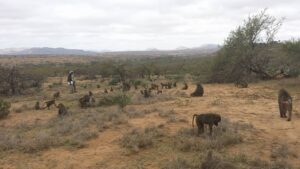Illuminating Humanities: Victoria Green
Highlighting Humanities Research and its Impact
Victoria Green | Philosophy and Humanities

Victoria Green, Ph.D. Candidate, Department of Philosophy & Humanities, Texas A&M
The Glasscock Center is excited to continue its series which highlights humanities research at Texas A&M, and the vital role played by the humanities at the university and in the world beyond the academy.
For this highlight, we invite Ph.D. Candidate, Victoria Green, to tell us about her Glasscock Graduate Research Fellowship supported by the Glasscock Center (2022-2023).
Victoria Green, a 2022-2023 recipient of the Glasscock Graduate Research Fellowship, is a Ph.D. Candidate in the Philosophy & Humanities Department at Texas A&M University. The fellowship has supported Green as she writes her dissertation, an applied ethics project that explores the ethics of primate (monkeys, apes, lemures) research in the wild. Inspired by her participation in the Rutgers University Primatology, Wildlife Ecology, and Conservation Field School in Kenya as an undergraduate, Green’s philosophical approach to primate studies is shaping conversations on our relationship with the nonhuman world.
Her experiences in Kenya led Green to conclude that researchers like herself were not neutral observors of wild primates. In fact, it proved quite the opposite, and she discovered that her mere presence could cause stress to the primates. To carry out her work successfully, she realized that “Primatologists must be swift, quiet, calm, attentive, and non-threatening.” Initially, Green struggled with her attempts at invisibility. Her enthusiasm once led her to “chase” a group of semi-habituated Tana River mangabeys, accidentally startling them as they lounged in the dense forest canopy. As she thought about her personal experiences with primates, Green became fascinated with the idea of exploring researcher-primate exchanges, as well as the methodologies primatologists had developed to navigate such interactions. This prompted her to explore the ethics of the long—up to fifteen years—habituation process in which researchers observe primates as neutral entities, and how, over time, the primates begin to tolerate the researcher’s presence.
To address the ethical concerns related to primatology, Green’s scholarship draws from the mid-level principles constructed by philosophers/medical ethicists Tom Beauchamp and James Childress. Green has applied the concept of Beauchamp and Childress’s mid-level principles to primate research, and proposed three mid-level principles for primatology: flourishing, reciprocity, and protection from vulnerability. These principles are designed to help primatologists determine if it is ethically permissible to habituate a new group of primates and, if so, how to engage with them in ways that ensure primate safety. Green’s work has the opportunity to change how primatologists conduct research. First, habituation lies at the foundation of wild animal behavioral research, and primatologists in particular, discuss the ethical dimensions of habituation. Second, the International Union for Conservation of Nature (IUCN) Red List of Threatened Species lists the majority of primate species as threatened by extinction. As Green notes, “ researchers are rightfully concerned that their research on such fascinating species may harm vulnerable populations, even though most primate research has the goal to ultimately protect and conserve primates.” Green’s dissertation will provide primatologists with guidance to ethically observe primates to minimize the negative effects of human influence.
By forging a partnership between the sciences and humanities, Green hopes that her research appeals to a diverse audience. Green aims for her work “to be relevant and helpful for those outside of the philosophical discipline … When I am told that a philosophical approach to habituation articulates something that researchers have felt or observed but could not describe within the paradigms of scientific writing, it validates that … philosophy–and the humanities as a whole–is relevant for the complex situations we face today, especially in relation to the impacts of global climate change and our relationship with the nonhuman world.” She believes that partnership between the sciences and humanities is crucial in offering thoughtful solutions to the climate crisis, which in turn affects the conservation work of primatologists. Additional projects stemming from her interest in the exploration of how our relationships with particular topics influence our conceptualization of the nonhuman world, include the aesthetics of decomposition of animal bodies, our interface with pets or companion animals, and coloniality in conservation.
You may find Victoria Green’s initial research on her dissertation, published in the American Journal of Primatology here. She will also present a project alongside Emily Brady (Professor of Philosophy, Texas A&M University) at the American Philosophical Association (APA) Central in late February titled, “Aesthetics, Fascination, and Animals.”

A vervet monkey observes humans from the safety of the tree canopy in the Masai Mara National Reserve, Kenya.

Students on the Rutgers Primatology, Wildlife Ecology, and Conservation field school walk among a habituated group of baboons in Laikipia county, Kenya. It was while among this group of baboons that Green began reflecting on the impacts of habituation.
